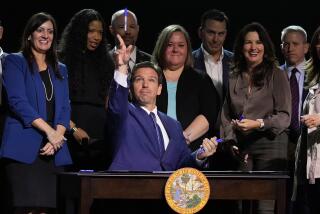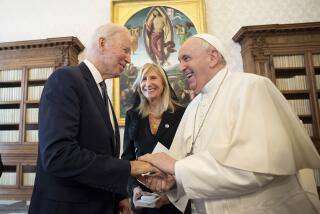Exemption of Poor From Income Taxes Urged by U.S. Catholic Bishops : Erasing Burden on Needy Must Be a Top Priority for Reform, They Say
- Share via
WASHINGTON — Meaningful tax reform must begin with tax relief for the poor, which should be a condition of any tax reform plan adopted by Congress, a spokesman for the nation’s Roman Catholic bishops said Thursday.
“We believe that it is essential that Congress take the necessary steps to repair the damage that has been done to the poor in recent years,” said the Rev. Daniel F. Hoye, general secretary of the U.S. Catholic Conference. “A major step in that direction can be achieved by once again exempting the poor from federal income taxes and offsetting for them a substantial portion of the highly regressive Social Security tax.”
Cause for Hope
Hoye made his remarks in testimony submitted to the House Ways and Means Committee, which is considering a variety of tax reform proposals. The U.S. Catholic Conference is the action arm of the nation’s Roman Catholic bishops.
Hoye said he was pleased that the Reagan Administration’s tax reform proposal and other plans would “significantly reduce or eliminate income taxes on the poor” and that there seems to be a growing consensus that significant relief for the poor must be an element of federal tax reform.
“Eliminating the tax burden on families and individuals who are poor must, in our view, be a top priority,” Hoye said. “Exempting those at or near the poverty line from federal income taxation should be a condition of any tax reform plan which Congress ultimately adopts.”
Upper-Income Brackets
But Hoye took issue with those advocating a “flat tax,” saying that Catholic social teaching supports the principle of progressiveness in the tax system and that it is “essential that this principle be incorporated as a major characteristic of any revision in the federal tax code.”
He said upper-income taxpayers “have already received large tax reductions as a result of the 1981 tax bill.”
Noting that reform proposals under consideration would lower the maximum tax rate to 35% or less, Hoye said the results would mean large tax cuts for the wealthy and small amounts of relief for middle-income and working-class people.
“If we are to have a fair and effective tax structure--one that raises sufficient revenues to meet our nation’s social needs--then wealthy individuals and corporations must pay their fair share,” he said. “It is simply not acceptable to force middle-income and working-class Americans to bear a greater and greater share of the federal tax burden.”
Hoye also urged the tax writing committee to restore the corporate income tax to “more appropriate levels.” He also expressed concern at the proposal to eliminate the above-the-line charitable contribution deduction for those who don’t itemize and suggested that tuition tax credits be made a part of the tax reform bill.
More to Read
Sign up for Essential California
The most important California stories and recommendations in your inbox every morning.
You may occasionally receive promotional content from the Los Angeles Times.












